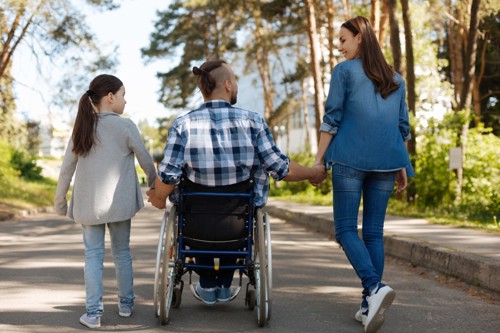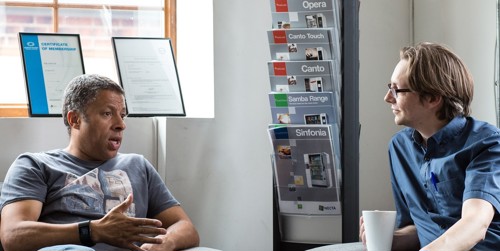Coping with tough emotions and looking forward

How are you feeling right now? Angry? Disappointed? Worried? Relieved?

boy wearing glasses looking away, sitting outside
A second year running of cancelled exams feels impossible - yet it’s happening once again. There’s no right or wrong way to feel about it: this is not a normal situation for any of us.
Thousands of students experienced this disruption and disappointment in 2020, and now thousands more face the uncertainty in 2021 as COVID-19’s impact continues to be felt. The pandemic has affected everyone in different ways. No two students will react to the cancellation in the same way.
Yet there are things that you can do, and actions you can take, to navigate the months ahead, cope with disappointment and look positively towards a brighter future. Follow these steps, using the acronym FLAIR, and build the confidence to face any uncertainty you’re worried about right now.
Focus on the here and now
The COVID-19 pandemic is where we need to focus currently: everyone has been challenged by the pandemic in one way or another, and we all feel differently about it. There’s no ‘correct’ or ‘incorrect’ way to experience an event like this.
You may feel that you haven’t been impacted by the pandemic at all until now, and that’s absolutely fine. Equally, you may have really struggled with the lockdown restrictions: that’s also fine. The cancellations of exams may be the first time you’ve been personally impacted by COVID-19. You may feel guilty about voicing your disappointment if you have friends who have lost family members or seen the impact on loved ones working on the front line. Don’t feel guilty: you have the same right as everyone else to be upset by COVID-19 altering your plans and what you have been preparing for. This isn’t a competition.
Focus on how you are feeling, right now. Ask yourself:
- Has the pandemic altered how you feel about your exams, compared to a year ago?
- What emotions are you experiencing right now?
- Who can you turn to for support?
- What would be the most helpful thing that you can do - currently - to feel positive?
Look back - and forward: what are your challenges and ambitions?

Losing the opportunity to sit exams in 2021 may be disappointing after what likely feels like many months and years of hard work in tough circumstances. But your efforts haven’t been in vain. Exams are only one part of your academic journey; they are not your final destination. The cancellation of exams doesn’t diminish your experience of school or college. It still happened and was still worthwhile. The work and effort you put in has not been wiped out; the memories will still be there whether exams happen or not.
LOOK BACK
Spend some time reflecting on the journey you have had up until this point, and ask:
- What have been the highlights of being at your school/college?
- Who have been the significant people alongside you?
- What challenges have you overcome?
- What has been your greatest achievement?
- What do you maybe wish had gone differently?
The work you’ve completed over the years will now help your teachers to determine your grades; it might not look like a conventional exam, but the work you have done and perhaps continue to be doing still matters. Nothing has been wasted; the ending has just taken a different course from the one you had expected or hoped for. It all still counts.
LOOK FORWARD
Exams matter, and how you feel about not taking them might be especially real and raw at the moment.
But it won’t always feel like this. Take a moment to think ahead, and ask:
- What were your ambitions before the pandemic, when you had no reason to ever expect exams wouldn’t happen?
- Where do you hope to be in 5 years’ time?
- What would you like to be doing in 10 years’ time?
- What do you need to help you get there?
Those dreams and ambitions are still real and achievable. COVID-19 and the events of the last year are an unexpected and tough interruption – but not the end of the story.
Acknowledge, accept, adapt

We used to all say ‘how are you?’ to each other and answer ‘fine, thanks’ usually. That was before March 2020, when coronavirus first began to impact our lives in the UK. Since then, we have had to accept and acknowledge the situation and adapt to the ‘new normal’ that is life at the moment.
You’ve no doubt felt many emotions since being told exams had been cancelled:
Negative: Anger, frustration, disappointment, sadness, confusion, worry, anxiety, irritated, annoyed, devastated, pessimistic, depressed
Positive: Happy, elated, relief, joy, optimistic, excitement, euphoria
Or you might have felt something completely different. And that’s ok.
It’s important to recognise and acknowledge how you feel, even if it’s difficult or painful. Being able to name and acknowledge your feelings gives you the vocabulary to communicate these with someone else and seek help if you are feeling overwhelmed, switched off or disconnected.
How you feel now might not be how you feel tomorrow; thoughts and feelings come and go quite quickly. You may feel differently when the reality of not taking your exams kicks in. You may experience different emotions when you get your grades later in the year.
We’re living in an ever-changing world, with a rapidly evolving pandemic situation. Keep track of how you are feeling by doing a regular wellbeing check-in with yourself. Identifying what you need isn’t just good for you; it may also help you to support a friend.
So, what you do need? Think about the things you could do that are helpful (eating well, exercise, getting a good night’s sleep), and things that maybe you need to do less (such as spending too much time alone – it’s still possible to connect, even in a lockdown!). Even if they’re hard to stick to, naming a few things you know COULD make a difference can help shift your perspective towards a more positive outlook and hope that things can change.
Identify: spot the signs if you or your friends are struggling
The uncertainty of missing exams may cause more harm to mental health and wellbeing for some than others. We all have times when our mental health is good as well as less good, the same as our physical health.
Knowing how to look after yourself and when to ask for help doesn’t just apply when our lives get turned upside down by huge global events happen. Anything unexpected can knock us sideways – it could be a comment someone makes, being let down, bad weather, poor sleep or broken relationships. But how do you know when things are getting too much, and you might need some extra support?
You may have already asked yourself these questions:
- How can this happen for a second year running?
- How can I be properly assessed when I’ve missed so much school/college time?
- What if I haven’t worked hard enough, because I was relying on the exams to see me though?
- What if I get grades higher than I expected, and college/university expect more of me than I can give?
- What’s the point in working hard if I can’t now prove myself in exams?
- What if I don’t get the grades I wanted because I didn’t get to take the exam?
These are ALL normal questions. These are also sadly not questions anyone is fully able to answer in full right now. This is a situation your teachers/lecturers didn’t want for you either.

It’s perfectly OK to feel upset or worried, but you may also need more support if you have been consumed by what’s happened, or if it is having a negative impact on your day-to-day life or general health. Look out for these signs in yourself and in your friends:
- Changes in sleep – struggling to sleep or finding you are sleeping lots more.
- Changes to appetite – losing your appetite or eating more highly processed ‘junk’ foods.
- Changes in mood – you might feel more sad, anxious or distressed than usual, or just not enjoying the things you used to. You might find you are less motivated to study, and now care a lot less about what grades you get or what the next chapter of your life will look like.
- Changes to social life – there have been far fewer opportunities to socialise and spend time with the people we care about during the pandemic, but technology has allowed us to stay connected to others. You might, however, have stopped replying to messages or feel less motivated to communicate, preferring to be alone.
- Changes to self-care – most people have probably had more than one pyjama or sofa day during the pandemic! But you might find you haven’t changed your clothes or bothered to wash for longer periods than usual.
- Changes in outlook – it’s healthy to have things we look forward to, whether they are immediate or further ahead. You might be finding it hard to feel excited or hopeful for the future at the moment.
If you can identify even remotely with any of the above, then please reach out and speak to someone. It could be someone you live with, a friend or someone you trust at school/college. Don’t let your health and wellbeing suffer because of what’s happening. Seek help and support now – don’t allow what has happened to impact your future any more than it has to.
Respond: take care of yourself and look out for your friends
You may be feeling OK about the situation - but are your friends?

You’ve navigated school or college together through the all the ups and downs to reach the point of your exams - and now you won’t be crossing the final hurdle of exams together in the way you imagined. You may be coping just fine with that, but you may have friends who aren’t finding it quite so straightforward.
If you have a friend who has directly told you they’re struggling – see that as a privilege that they trust you. Or maybe you have seen some of the changes described above starting to take hold in someone you care about.
ASK: If in doubt – ask. Always ask. It hasn’t got to be a grand gesture or an overly formal meeting – just ask if they’re ok and tell them why you’re asking.
LISTEN: You don’t have to understand in order to help: COVID-19 has been different for everyone. Some people have had to endure lockdowns in difficult home situations or may have really struggled without contact with others. Don’t judge. Don’t try to have any answers or ‘fix’ anything – just listen. Acknowledge how they feel – sometimes the most helpful thing is just to hear someone agree that yes, things are tough right now but that they are not alone in how they feel.
REFER: A listening ear and a few words of encouragement can make a big difference, but sometimes our friends need more help than we’re qualified to give. If you have any concerns, see dramatic changes in your friend’s mood, or they say anything that suggests a sense of hopelessness then they need to seek help. If they aren’t willing to do this themselves then it’s really important you speak out on their behalf. A good starting point is a member of staff from your school or college: it’s vital to pass on your concerns to someone who can help.
PROTECT: A huge part of friendship, especially right now, is being there for one another. Social media is flooded with #bekind and we all want to do the right thing by others - that’s great! But you also have to look after your own wellbeing. Be a good friend to others, but also be a good friend to yourself: sometimes that means others have to wait.
There are many ways to look after yourself - from getting more sleep, having a social media break (or a full digital detox) and a break from people or activities which cause you stress. Self-care is not selfish; you’re not letting anyone down. Taking a step back doesn’t mean you don’t still talk or spend time with your friends and family – it just means you’ve reached your own capacity to support others right now. Look after yourself to be able to look after others: you can’t pour from an empty cup.
Remember: this is not forever
The pandemic has been hard for everyone, and the cancellation of exams is a big setback. Yet the situation in which you find yourself now is not forever and will pass.
It matters - it really matters - and you may experience many emotions before you reach the other side. 10 years from now, your perspective on what’s happening is likely to be very, very different – but how you feel now is what matters most. Make it your goal to look back as a COVID-19 graduate with no regrets about how you looked after yourself today.

Resources
Was this article helpful?
Your feedback helps us create better content so if this article helped, please leave a like below and let others know.
The Charlie Waller Trust
The Charlie Waller Trust is a registered charity in England and Wales 1109984. A company limited by guarantee. Registered company in England and Wales 5447902. Registered address: The Charlie Waller Trust, First Floor, 23 Kingfisher Court, Newbury, Berkshire, RG14 5SJ.
Copyright © 2025 The Charlie Waller Trust. All rights reserved.




